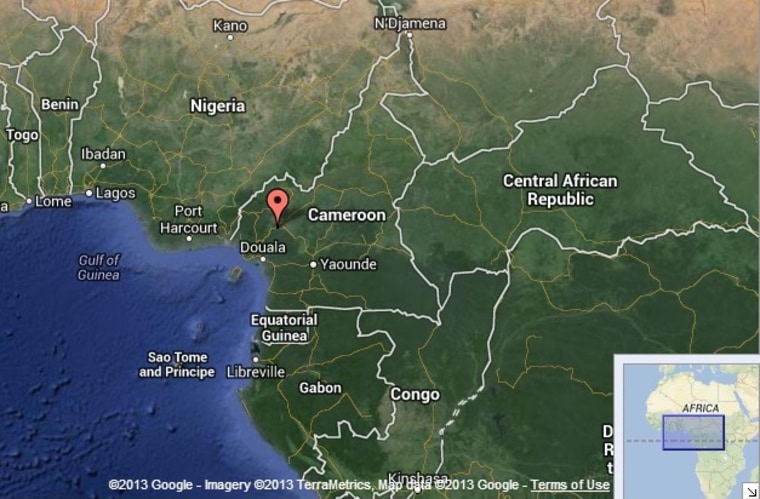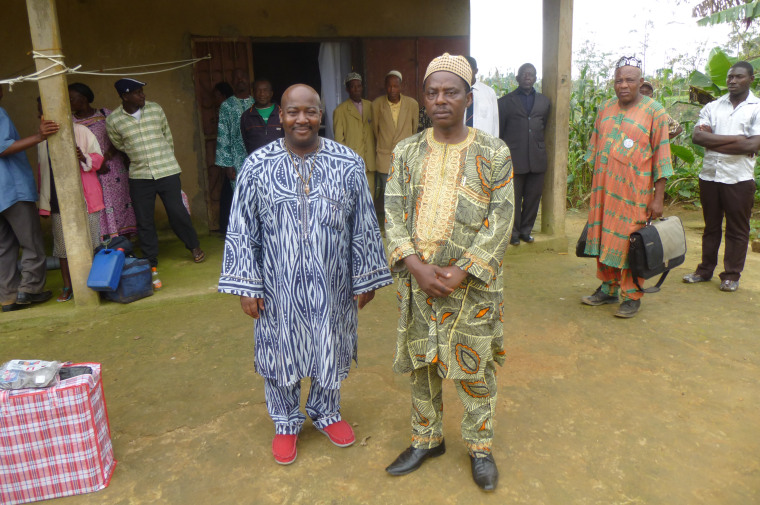African-American businessman William Holland's royal ancestors were subjected to slavery in Virginia — but they were handed over into slavery by Africans. Now a descendant of those tribespeople has issued a formal apology to Holland for his ancestors' role in the 18th-century slave trade.
The head chieftain for the Cameroonian town of Bakou, Ngako Ngalatchui, told NBC News that he signed the statement on Saturday.
"We are sorry and issue an official apology for our involvement and the involvement of our ancestors in the horrible institution of transatlantic slavery," the statement read. "The United States of America, France, and the United Kingdom should issue similar formal apologies for this evil institution that broke up families and caused generational hardships that continue to the present day."
This isn't the first time Africans have acknowledged the historical role their forefathers played in slavery. It's long been known that, in centuries past, warring tribes took captives and traded them to white slave merchants. That marked the first step in the long road to the plantations of the American South.
Matthieu Kerekou, the president of the West African nation of Benin, caused a sensation in 1999 when he apologized to African-American clergy for his country's role in the slave trade. Ever since then, officials from Benin have been traveling to the United States to offer their regrets and seek reconciliation.
"I knew one day I wanted to come to this land and ask forgiveness of my black brothers and sisters," one of Benin's provincial kings told a gathering in Alabama this summer. Leaders from other West African nations, such as Ghana and Nigeria, have issued or at least discussed similar apologies.

The apology signed by Ngalatchui, a member of Cameroon's tribal nobility who is also known as the Fon of Bakou, is unusual in that it's directed toward a specific family. Genetics has something to do with that. Over the course of several years, Holland has employed DNA tests to narrow down the area where his African ancestors lived. For Holland and millions of others whose forebears came to America unwillingly as slaves, such genetic testing provides the only way to trace ancestry back more than a few generations.
After some fits and starts, Holland's genetic findings pointed to a connection with Cameroon's Oku clan — and that opened the way to deeper historical revelations.
Modern-day members of the Oku clan tell of a time in the 1770s when scores of their ancestral kin were abducted by rival clans, and passed on to the slavers. That time frame matches up with the transatlantic voyage that Holland's great-great-great-great-grandfather took to Virginia, where he was sold as a slave.
The genetic tests, as well as genealogical pedigrees and tribal stories, suggested that Holland's roots go back to Bailack, a well-known patriarch of northwest Cameroon's Nso clan who came to Oku centuries ago.
Revisiting history
As Holland forged deeper ties with the royalty of Cameroon's clans, all that history became a major focus of discussion. This January, the Georgia-based businessman restored three long-lost ceremonial masks to the Oku and Nso clans — and took the opportunity to show them chains and shackles that were used on slaves in America.
Holland said the Cameroonians were shocked by the story he told. "They said, 'It's time to make amends with the gods. It's time to do something with the families and re-establish a relationship,'" he recalled.
That's how the letter of apology got its start. Although the document specifically mentions Holland and his family, Holland emphasized that the expression of regret doesn't apply merely to one African-American clan.
"It also represents thousands of other people who have an ancestral tie to Cameroon, one way or another," he told NBC News before his departure for Cameroon. "They're apologizing for that situation."
Last week, Holland and eight traditional leaders in Bakou's jurisdiction — including Ngalatchui himself — toured the sites where the slave trade was conducted.
The tour came to a dramatic climax during a ceremony on Saturday, when all of the leaders were to issue their formal apology in Bakou, in front of hundreds of local residents. At the last minute, the leaders balked at signing the English-language document that Holland had prepared. Instead, they put their names to a different document that was drawn up in French, Cameroon's other official language.
The paper-shuffling snag created some bad feelings on what was meant to be a day of transatlantic reconciliation. "I'm still hot about it," Holland said by telephone from Cameroon. Later in the day, Holland brought his own document to the Fon of Bakou's palace, and Ngalatchui agreed to endorse the apology as written.
"Personally I signed the document," Ngalatchui told NBC News on Sunday.
As he prepared for his return to America, document in hand, Holland said he was processing the week's emotional ups and downs. There's a lot to process — stemming not only from the proceedings in Bakou, but also from the visits to places that his ancestor almost certainly passed through, bound in the chains of slavery.
"It's overwhelming," he said.
Previous chapters in the African saga:
- 2010: DNA points to royal roots in Africa
- 2011: Family roots get tangled up in Africa
- 2011: Black history saga comes full circle
- 2011: Africans visit their American cousins
- 2011: Genes tell a tale as big as Africa
- 2012: African-American's roots revised
- 2012: Tribal treasures recovered through eBay
- 2013: Treasures returned amid history lesson
- African American news from theGrio
Correction for 8 p.m. ET Oct. 29, 2013: The map accompanying the original version of this item did not reflect the location of Bakou correctly.
Update for 10:05 p.m. ET Jan. 11, 2014: I've updated the headline and some of the references in the item to better reflect the Holland family's royal roots.
Alan Boyle is NBCNews.com's science editor. Connect with the Cosmic Log community by "liking" the log's Facebook page, following @b0yle on Twitter and adding the Cosmic Log page to your Google+ presence. To keep up with Cosmic Log as well as NBCNews.com's other stories about science and space, sign up for the Tech & Science newsletter, delivered to your email in-box every weekday. You can also check out "The Case for Pluto," my book about the controversial dwarf planet and the search for new worlds.
